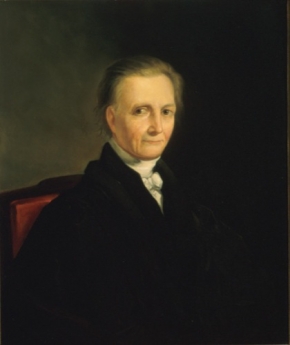You are here
Circuit Court Opinions:
Associate Justice Bushrod Washington, United States v. Bright (1809)

United States v. Bright, 24 F. Cas. 1232 (C.C.D. Pa. 1809) (No. 14,647) [Third Circuit]
The Bright case arose out of a disputed admiralty prize after Americans captured a British ship during the Revolutionary War. The dispute was first decided by a Pennsylvania state court, the judgment of which was reversed by the Court of Appeals in Cases of Capture, a national court established under the Articles of Confederation. The state court, however, refused to recognize the appellate court’s jurisdiction in the matter and ignored its decision. Years later, Gideon Olmsted, who had won the appeal, petitioned the U.S. district court for enforcement of the judgment. U.S. District Judge Richard Peters found in Olmsted’s favor, but the Pennsylvania legislature passed a law forbidding the execution of Peters’s judgment, presumably because the state had received a portion of the prize money under the state court judgment.
The Supreme Court of the United States, on a petition from Olmsted, issued a writ of mandamus ordering Peters to enforce his judgment. Acting on orders from the governor, state militia brigade commander Michael Bright had his men guard the home of two representatives of the deceased state treasurer who had received the state funds in question. Brandishing muskets and bayonets, the men prevented the U.S. marshal from serving Peters’s writ of execution.
Charged with resisting the authority of the United States, Bright rested his defense on the claim that the district court’s judgment was void because the Court of Appeals in Cases of Capture had lacked authority to reverse the judgment of the state court, and on the fact that he had acted pursuant to the governor’s orders. Justice Washington dispensed with the first argument by citing Supreme Court precedent to the effect that the former appellate court’s authority to reverse the admiralty judgments of state courts was a matter of settled law.
Washington also held that Pennsylvania’s attempt to nullify the judgment of a federal court was “unconstitutional and void” on the basis that the Constitution proclaimed federal law to be the supreme law of the land. Bright and the other defendants, Washington instructed the jury, were therefore bound to disobey the illegal orders of the state governor. Any other result, he explained, would lead to the demise of civil authority such that the United States could enforce its laws only by force. A doctrine that following the order of a state government justified violating federal law “appears to us monstrous,” he wrote, “the consequences of it terrible.” The defendants were convicted and sentenced to prison but were immediately pardoned by President James Madison. The Bright case was an early example of a justice on circuit reaffirming the supremacy of federal law in the face of a challenge by state officials.
